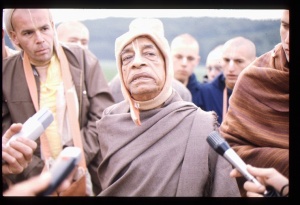SB 3.12.39: Difference between revisions
m (1 revision(s)) |
(Vanibot #0054 edit - transform synonyms into clickable links, which search similar occurrences) |
||
| (One intermediate revision by one other user not shown) | |||
| Line 1: | Line 1: | ||
{{info | {{info | ||
|speaker=Maitreya | |speaker=Maitreya Ṛṣi | ||
|listener=Vidura | |listener=Vidura | ||
}} | }} | ||
[[Category:Srimad-Bhagavatam - Canto 03 Chapter 12]] | |||
[[Category:Bhagavatam Verses Spoken by Maitreya Rsi - Vanisource|031239]] | |||
<div style="float:left">'''[[Srimad-Bhagavatam]] - [[SB 3|Third Canto]] - [[SB 3.12: Creation of the Kumaras and Others|Chapter 12: Creation of the Kumāras and Others]]'''</div> | |||
<div style="float:right">[[File:Go-previous.png|link=SB 3.12.38]] '''[[SB 3.12.38]] - [[SB 3.12.40]]''' [[File:Go-next.png|link=SB 3.12.40]]</div> | |||
{{RandomImage}} | |||
==== TEXT 39 ==== | ==== TEXT 39 ==== | ||
<div | <div class="verse"> | ||
itihāsa-purāṇāni | :itihāsa-purāṇāni | ||
pañcamaṁ vedam īśvaraḥ | :pañcamaṁ vedam īśvaraḥ | ||
sarvebhya eva vaktrebhyaḥ | :sarvebhya eva vaktrebhyaḥ | ||
sasṛje sarva-darśanaḥ | :sasṛje sarva-darśanaḥ | ||
</div> | </div> | ||
| Line 16: | Line 22: | ||
==== SYNONYMS ==== | ==== SYNONYMS ==== | ||
<div | <div class="synonyms"> | ||
''[//vanipedia.org/wiki/Special:VaniSearch?s=itihāsa&tab=syno_o&ds=1 itihāsa]'' — histories; ''[//vanipedia.org/wiki/Special:VaniSearch?s=purāṇāni&tab=syno_o&ds=1 purāṇāni]'' — the ''Purāṇas'' (supplementary ''Vedas''); ''[//vanipedia.org/wiki/Special:VaniSearch?s=pañcamam&tab=syno_o&ds=1 pañcamam]'' — the fifth; ''[//vanipedia.org/wiki/Special:VaniSearch?s=vedam&tab=syno_o&ds=1 vedam]'' — the Vedic literature; ''[//vanipedia.org/wiki/Special:VaniSearch?s=īśvaraḥ&tab=syno_o&ds=1 īśvaraḥ]'' — the Lord; ''[//vanipedia.org/wiki/Special:VaniSearch?s=sarvebhyaḥ&tab=syno_o&ds=1 sarvebhyaḥ]'' — all together; ''[//vanipedia.org/wiki/Special:VaniSearch?s=eva&tab=syno_o&ds=1 eva]'' — certainly; ''[//vanipedia.org/wiki/Special:VaniSearch?s=vaktrebhyaḥ&tab=syno_o&ds=1 vaktrebhyaḥ]'' — from his mouths; ''[//vanipedia.org/wiki/Special:VaniSearch?s=sasṛje&tab=syno_o&ds=1 sasṛje]'' — created; ''[//vanipedia.org/wiki/Special:VaniSearch?s=sarva&tab=syno_o&ds=1 sarva]'' — all around; ''[//vanipedia.org/wiki/Special:VaniSearch?s=darśanaḥ&tab=syno_o&ds=1 darśanaḥ]'' — one who can see all time. | |||
</div> | </div> | ||
| Line 23: | Line 29: | ||
==== TRANSLATION ==== | ==== TRANSLATION ==== | ||
<div | <div class="translation"> | ||
Then he created the fifth Veda—the Purāṇas and the histories—from all his mouths, since he could see all the past, present and future. | Then he created the fifth Veda—the Purāṇas and the histories—from all his mouths, since he could see all the past, present and future. | ||
</div> | </div> | ||
| Line 30: | Line 36: | ||
==== PURPORT ==== | ==== PURPORT ==== | ||
<div | <div class="purport"> | ||
There are histories of particular countries and nations and of the world, but the Purāṇas are the histories of the universe, not only in one millennium, but in many kalpas. Brahmā has knowledge of those historical facts, and therefore all the purāṇas are histories. As originally composed by Brahmā, they are part of the Vedas and are called the fifth Veda. | There are histories of particular countries and nations and of the world, but the ''Purāṇas'' are the histories of the universe, not only in one millennium, but in many ''kalpas''. Brahmā has knowledge of those historical facts, and therefore all the ''purāṇas'' are histories. As originally composed by Brahmā, they are part of the ''Vedas'' and are called the fifth ''Veda.'' | ||
</div> | </div> | ||
__NOTOC__ | |||
<div style="float:right; clear:both;">[[File:Go-previous.png|link=SB 3.12.38]] '''[[SB 3.12.38]] - [[SB 3.12.40]]''' [[File:Go-next.png|link=SB 3.12.40]]</div> | |||
__NOTOC__ | |||
__NOEDITSECTION__ | |||
Latest revision as of 21:27, 17 February 2024

A.C. Bhaktivedanta Swami Prabhupada
TEXT 39
- itihāsa-purāṇāni
- pañcamaṁ vedam īśvaraḥ
- sarvebhya eva vaktrebhyaḥ
- sasṛje sarva-darśanaḥ
SYNONYMS
itihāsa — histories; purāṇāni — the Purāṇas (supplementary Vedas); pañcamam — the fifth; vedam — the Vedic literature; īśvaraḥ — the Lord; sarvebhyaḥ — all together; eva — certainly; vaktrebhyaḥ — from his mouths; sasṛje — created; sarva — all around; darśanaḥ — one who can see all time.
TRANSLATION
Then he created the fifth Veda—the Purāṇas and the histories—from all his mouths, since he could see all the past, present and future.
PURPORT
There are histories of particular countries and nations and of the world, but the Purāṇas are the histories of the universe, not only in one millennium, but in many kalpas. Brahmā has knowledge of those historical facts, and therefore all the purāṇas are histories. As originally composed by Brahmā, they are part of the Vedas and are called the fifth Veda.